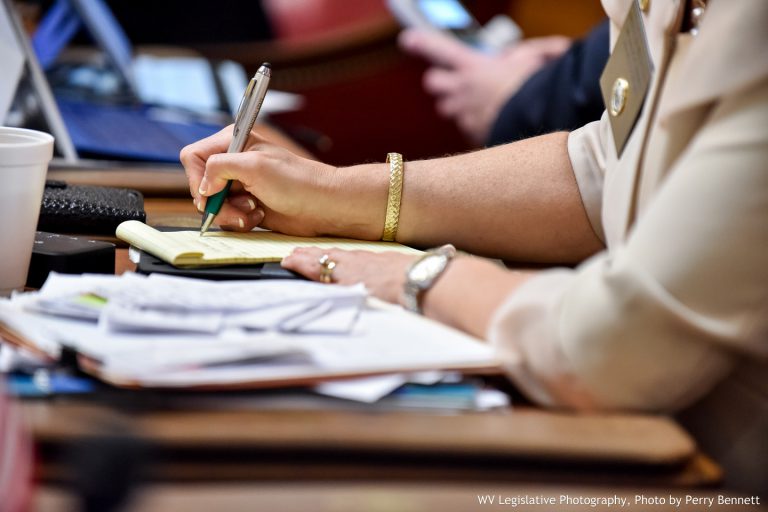As of 4 p.m., Wednesday, February 1, 2012, the 22nd day of the 80th Legislature’s 2nd Regular Session, 1083 bills have been introduced in the House. Of those, 9 passed this week and have been sent to the Senate for its consideration. The bills passed by the House this week include:
House Bill 4062 would ensure that in-home care workers are certified and are registered in the state of West Virginia. In-home care workers must meet all eligibility requirements according to the provisions of this bill including educational and certification requirements and the completion of a criminal background check.
House Bill 4103 would authorize the Division of Motor Vehicles to take a lead role in planning and coordinating the consolidation of government services and enforce laws currently administered by various state agencies pertaining to the motor carrier industry.
House Bill 4107 would provide online training for firefighters as well as provide them with proper safety equipment. The bill would require the State Fire Commission to establish the training requirements for volunteer firefighters by legislative rule, on or before July 30, 2012.
House Bill 4125 would amend the date of annual notice to parents and guardians of students at school, and alert them to the existence of the school’s crisis response plan. It would also alter a school’s ability to review a redacted copy at the offices of the county board.
House Bill 4238 would establish an Address Confidentiality Program for voters on the absentee voting list. It also establishes certain methods and procedures of ballot provision and application that would serve to protect a program participant’s location information.
House Bill 4250 would alter the Uniform Real Property Electronic Recording Act. The bill specifies the meaning of terms related to the Uniform Real Property Electronic Recording Act, and also clarifies the allowance of documents to be signed electronically.
House Bill 4251 would amend the Uniform Commercial Code. The bill would specify that the term “Public organic record” mean a record that is available for public inspection, and is generally making technical changes and providing transitional rules.
House Bill 4291 would determine the appropriate number of law libraries being used in the state. The number of libraries would be determined by the Supreme Court of Appeals and would also expend money to be used for the purchase of books and materials to be used in the libraries.
A Sampling of the Bills Introduced in the House
House Bill 4301 would reimburse patients for medical records. The bill would require that one copy of medical records be provided to the patient at no cost, and the patient is limited to one set of copies.
House Bill 4310 would prohibit sex offenders from living within 1,000 feet of the outer perimeter of a school, childcare facility, playground or a victim’s home. In addition it puts further restrictions on sex offenders.
House Bill 4316 would restrict any new permits, permit modifications, and permit renewals that would allow for underground injection of coal slurry.
House Bill 4340 would be meant to inform parents, coaches, and youth about the dangers of a concussion or head injury during athletic events. Prior to each athletic season, parents or guardians and young athletes would be required to sign a concussion and head injury information sheet before the initiation of any athletic practice or event. A youth athlete who is injured during an athletic event would be removed from play and would not be allowed to resume until a licensed health care provider issued written clearance.
House Bill 4341 would allow employees to donate leave to another employee who requires an extended absence to care for a member of his or her household in the event of a medical emergency.
House Bill 4344 would control potentially dangerous wild animals. The bill specifies what types of animals are to be considered wild, and also details the situations when it is legal to harbor a wild animal. Some exceptions include wildlife refuges, circuses, and people who are temporarily harboring a dangerous wild animal through the state if the transit time does not exceed 24 hours.
House Bill 4346 would exempt disabled veterans who have become permanently and 100 percent disabled from service from state income tax as certified by the Department of Veterans’ Affairs of West Virginia.



 U.S. Senator Joe Manchin paid a visit during the Senate floor session this morning.
U.S. Senator Joe Manchin paid a visit during the Senate floor session this morning.
 The Senate read four bills for the first time today, including
The Senate read four bills for the first time today, including



 At the start of today’s session, the House honored Spencer resident, Drew Miller, who ran from Long Beach, California to Spencer, West Virginia to raise money and awareness for the
At the start of today’s session, the House honored Spencer resident, Drew Miller, who ran from Long Beach, California to Spencer, West Virginia to raise money and awareness for the  During today’s floor session six bills passed in the Senate. Among those bills was
During today’s floor session six bills passed in the Senate. Among those bills was